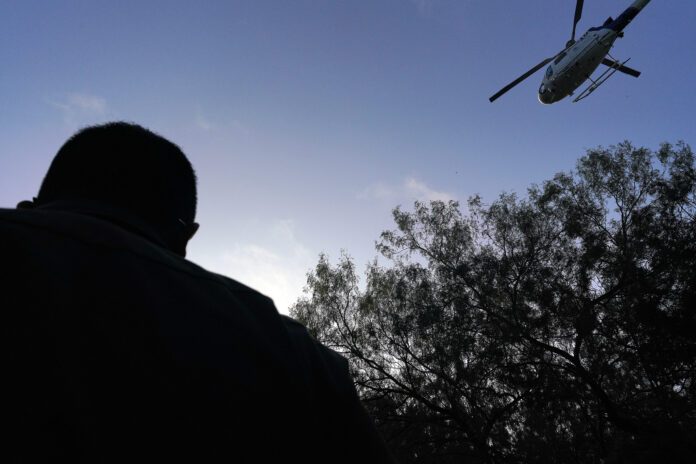
The Biden administration is planning to reimplement a program allowing migrants to request asylum and wait for their immigration court hearings from Mexico by mid-November. This would occur at several ports of entry — including ports in Brownsville and Laredo — but is contingent on Mexico’s willful participation.
Earlier this year, the Supreme Court found that the administration violated federal law when it ended the Migrant Protection Protocols on Jan. 20, the first day of Joe Biden’s presidency. Under the lower court ruling, the administration was instructed in late August to make a “good faith effort” to restart the program.
On Thursday afternoon, administration officials said they’ve been preparing to restart the program as early as the middle of November and acknowledged it requires binational cooperation.
“We, the U.S., cannot re-implement MPP without the independent decision by Mexico to agree to accept those individuals whom the United States seeks to enroll in MPP and send back to Mexico,” administration officials said, speaking to The Monitor on background.
Mexican government officials have expressed concerns to their U.S. counterparts and asked that solutions be incorporated into the MPP reimplementation proposal.
Administration officials said they are mainly dealing with “due process concerns, access to counsel concerns, and ensuring that particularly vulnerable individuals are not sent back to Mexico, given a concern about being able to provide them adequate protection.”
Under its first iteration, MPP drew much criticism for its inability to keep enrolled migrants safe after its implementation.
A civil lawsuit filed in Brownsville attempted to end the program that plaintiffs claimed led to cartel kidnappings, gang rape, disappearances and floating bodies.
U.S. officials said the reimplementation would differ in addressing the concerns raised by Mexico. Specifically, “ensuring that the cases are heard in a timely manner with a general commitment to do so, within six months of somebody being returned to Mexico,” instead of a process that previously took more than a year.
Mexican officials also want information to be readily available for individuals, information such as their hearing dates, access to counsel and an expansion of criteria for vulnerabilities that would make someone not amenable to MPP.
Currently, migrants who enter the U.S. seeking asylum are subject to processing under a federal health code, known as Title 42, that allows for their quick expulsion to Mexico. Until that policy ends, U.S. officials said migrants who are still subject to it will be expelled.
Once, and if, an agreement is reached with Mexico, U.S. officials at the border will determine who they will enroll into the program.
Thousands of migrants, many with families, have been expelled into Reynosa where they live in either shelters or a large encampment of about 2,000 people.
Some have been there — enduring illness, kidnappings, and child suicide attempts — since they were expelled months ago, waiting for the policy that placed them there to end and for a chance to request asylum in the U.S.
Upon learning of the U.S. court’s decision to restart the program that would allow them to request asylum, some of the encampment residents saw it as an improvement to their situation. Yet, it remains unclear if the thousands who have been sent back to Mexico under Title 42 will be eligible to be enrolled in MPP.
The lack of clarity in the application of the program could impact the path migrants take and the crossing points they choose to enter, an advocate said.
“If MPP is starting up where it was before, which is Brownsville, and everyone’s in Reynosa, what does that mean? How are they going to go from Point A to Point B?” Felicia Rangel-Samponaro, co-founder of the Sidewalk School, said Thursday.
Cofounders Rangel-Samponaro and Victor Cavazos helped provide education to children living in the Matamoros encampment that was shut down March 6, 2021, after providing a makeshift shelter to thousands in a two-year period.
“So, now we’re forcing Matamoros to now do something, because people are now going to start making their trek no matter what we say back to Matamoros, because that’s where you go to cross,” Rangel-Samponaro said.
Title 42 and MPP policies overlapped previously during a brief period between March 2020 and January 1, 2021.
During that time, Charlene D’Cruz, an immigration attorney and director of Proyecto Corazon, a project for Lawyers for Good Government, said the policies were used as a “one-two punch.” Some nationalities, like migrants from Cuba, Venezuela and Nicaraguans, were not subject to Title 42 expulsions and were enrolled into MPP.
“If one didn’t work, then they could do the other,” D’Cruz said.
D’Cruz’s clients who lived in Matamoros under MPP were often victims of violence. She believes there is no iteration of the policy that will ensure the safety of her future clients.
“MPP is just an inherently unfair policy,” D’Cruz said.
She questioned Mexico’s concerns raised with the U.S. regarding access to counsel and due process at an accelerated pace of six months.
D’Cruz worked in Matamoros during the first implementation of MPP. She often encountered technological problems on the Mexican side with clients lacking resources to charge or use their phones; some would lose their phones in kidnappings. Even recently, she was unable to reach any clients in Mexico when WhatsApp went down.
But problems were not limited to the Mexican side. Glitches in the Brownsville immigration courtroom also stalled the process. Some of her clients recently discovered a critical form vital to their work permit application was never filed at the Brownsville court, D’Cruz said.
Administration officials confirmed Thursday two of 10 locations where the program would be implemented across the southern border: Brownsville and Laredo.
In spite of the administration’s preparations, which include reopening the tent courts on the U.S. side, administration officials said they remain ideologically against the program.
A memorandum reaffirming the decision to terminate will be produced soon, administration officials said Thursday, adding that they will continue to seek the end of MPP’s implementation.



